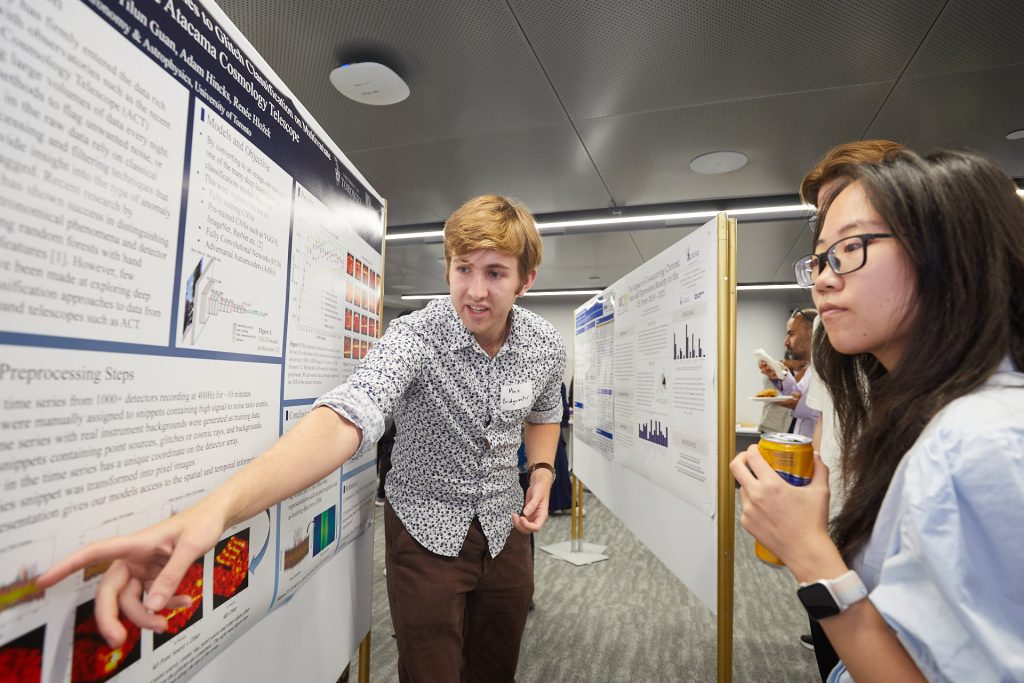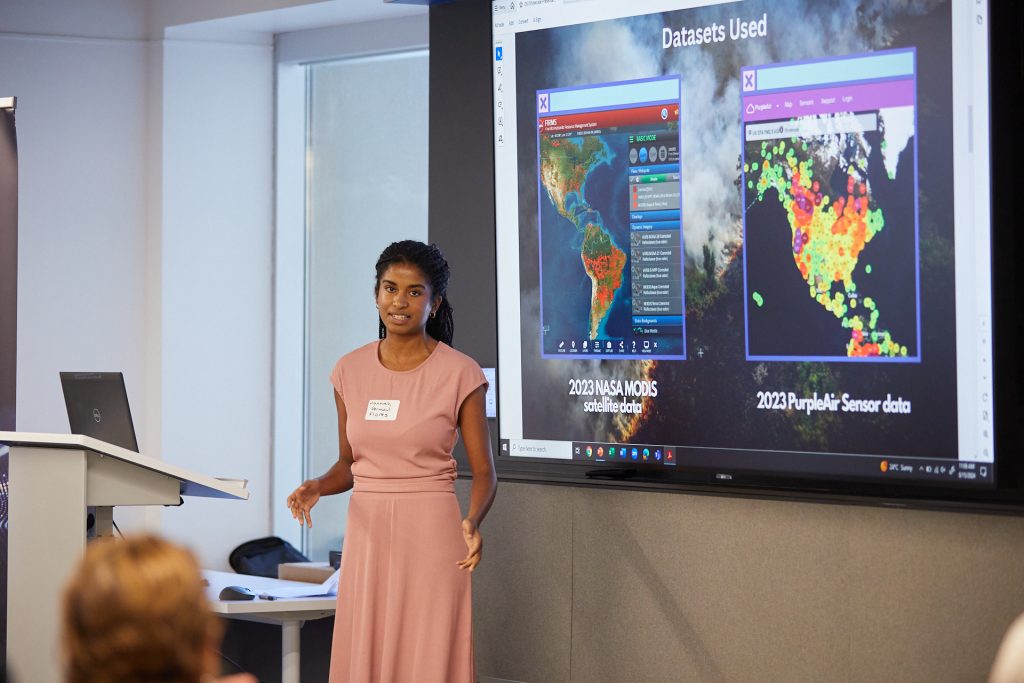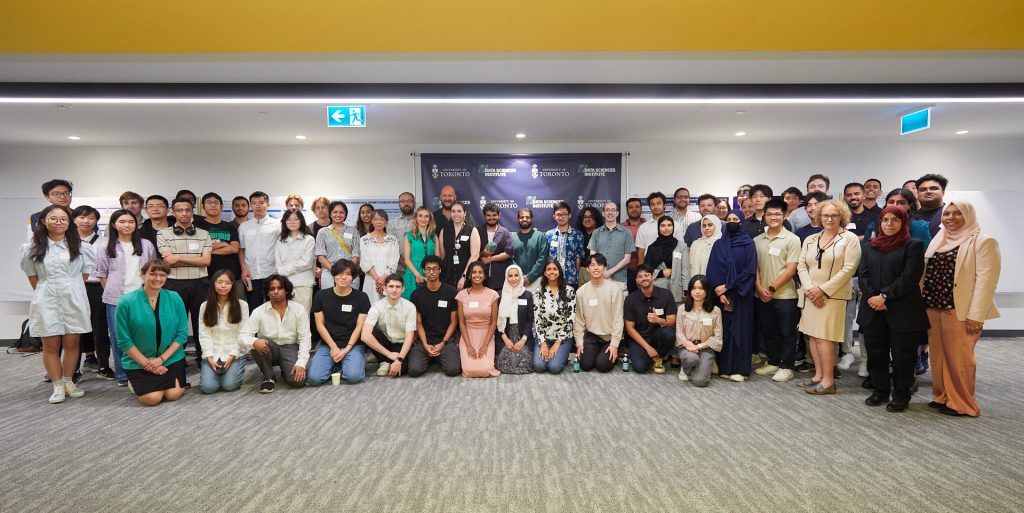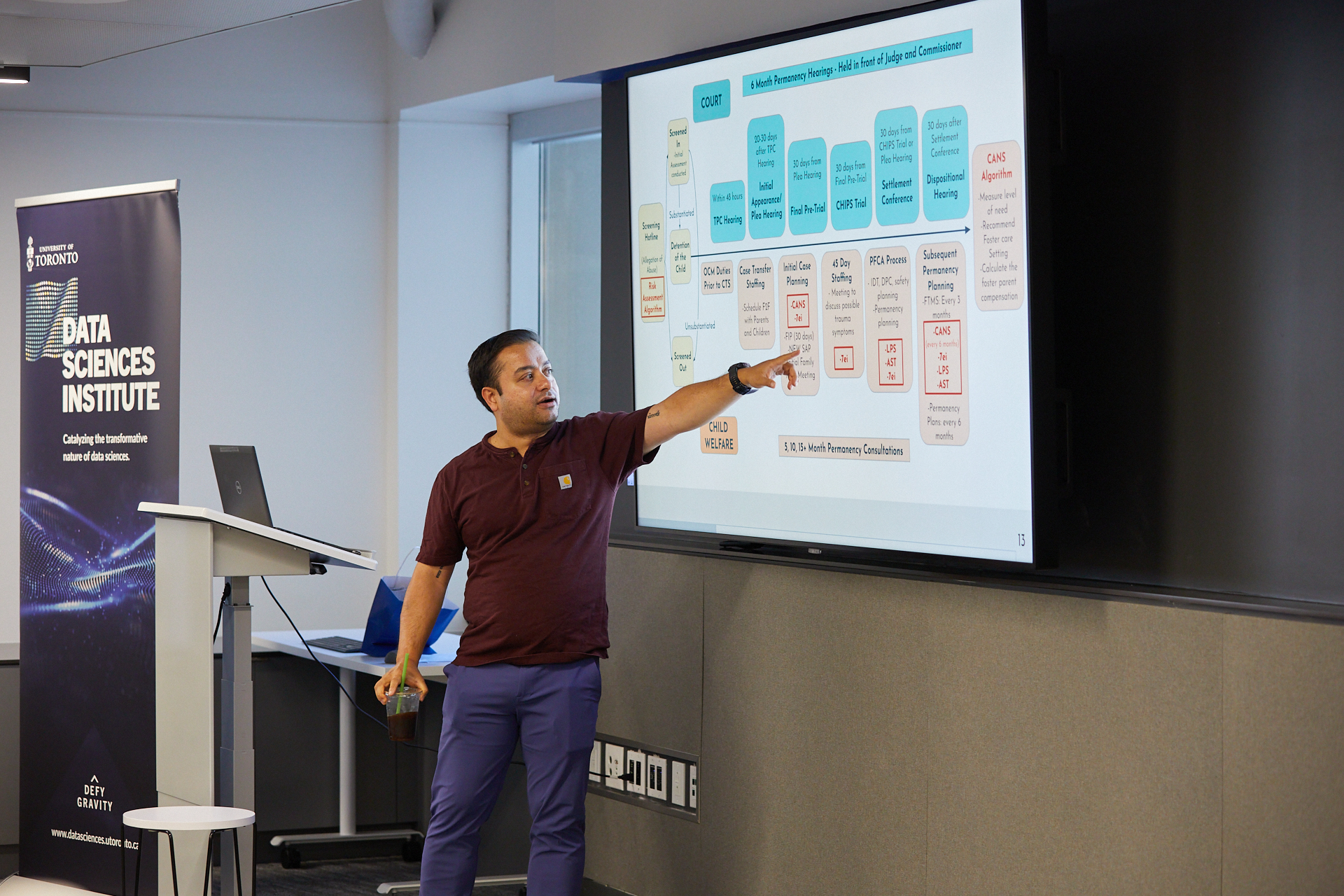By: Cormac Rea
Photos: Harry Choi Photography
The Data Sciences Institute’s (DSI) Summer Undergraduate Data Science (SUDS) Opportunities Program recently celebrated the achievements of its 2024 cohort with the annual SUDS Showcase – an exciting full day of research project presentations and poster sessions by 57 undergraduate students.
Designed as an annual marquee event to close the SUDS, the Showcase provides a forum for SUDS Scholars and Supervisors to share their data science research. A highlight of the day was keynote speaker, Prof. Shion Guha (Faculty of Information and Department of Computer Science, Faculty of Arts & Science, University of Toronto, Director, Human-Centered Data Science Lab), who spoke on the topic of Deconstructing Risk in Predictive Risk Models.

“A vibrant exhibition of the talent, the SUDS Showcase is always a great opportunity for students, supervisors and academic peers alike to connect over the many outstanding presentations, cutting-edge data science methods across a wide range of topic areas,” said Professor Laura Rosella, DSI Associate Director of Education and Training.
“SUDS offers an excellent bridge from academic study to a professional career in data sciences and machine learning.”
David Carter, whose research entitled Mass extinctions and nocturnal behaviour: an analysis of the cryptic activity patterns of arthropod explored the link between nocturnality and evolutionary advantage in Arthropods during mass extinction events, is using data science methods and tools to construct a database of Arthropod circadian rhythms.
“I recommend SUDS to anybody who wants to get quality research experience and develop their technical skills,” said Carter.
“I started SUDS being relatively new to coding and data analysis, and I was unconfident about my data science skills. The trainings helped me develop my skills, and I learned a lot and really enjoyed applying data science techniques to my research project.”
Ola Alyazidi’s oral presentation, Investigating the role of the X-chromosome in autoimmune diseases: A Bioinformatics Approach Leveraging Single-Cell Genomics, delved into the intricate relationship between genetics and autoimmune diseases.
“Being a SUDS scholar is a defining moment for me,” said Alyazidi. “My research journey into the role of the X chromosome in autoimmune diseases has been challenging yet incredibly rewarding.”
“This opportunity helps me to follow my dreams in bioinformatics. It is also a pivotal point in my educational journey, offering me the chance to connect with experts and advance my academic, professional, and personal growth.”

SUDS provides a rich summer training experience for students from a wide variety of academic backgrounds to be exposed to and apply data science techniques in their work. In this year’s SUDS, under the supervision of U of T and affiliated external partner researchers, students applied data science methods and tools to research on the robustness for machine learning models, to commercial determinants of health in online gaming, mass extinctions, nocturnal behaviour, sleep modeling, neural systems, and searching for stellar streams in the milky way.
This summer, three SUDS Scholars from the University of Toronto had the opportunity to intern at Ernst & Young (EY), thanks to Mitacs funding. Through such strategic partnerships, the DSI collaborates with organizations on transformative data-driven projects. By partnering with DSI and leveraging Mitacs funding, organizations can bring on talented U of T undergraduate students to advance their data science initiatives, driving innovation and impact over the summer.
In addition, 14 students from the King Abdullah University of Science and Technology (KAUST) Academy, recipients of prestigious awards from KAUST, were selected through a highly competitive process to participate in SUDS. KAUST specifically sought out the University of Toronto for this collaboration due to its world-renowned ranking in data science.
Along with their research projects, SUDS Scholars partake of the SUDS Cohort programming for networking, academic and professional development. This includes the Data Science@Work Series, where representatives from the private sector and government organizations share data science applications in the workplace. The scholars began their studies in May with the DSI Data Science Bootcamp, gaining proficiency in data science skills including Unix Shell, R, Python, and machine learning.
“Being a SUDS scholar is a defining moment for me,” said Alyazidi. “My research journey into the role of the X chromosome in autoimmune diseases has been challenging yet incredibly rewarding.”
“This opportunity helps me to follow my dreams in bioinformatics. It is also a pivotal point in my educational journey, offering me the chance to connect with experts and advance my academic, professional, and personal growth.”

“I had a really excellent time with my student, and it was exciting to see them take advantage of all of the opportunities, workshops, and networking events within the program, and for them to become an accomplished and productive [data] scientist in just three months,” said DSI supervisor Max Shafer, Department of Cell and Systems Biology, Faculty of Arts & Science, University of Toronto.
Distinction in the poster category was given to scholars Zeke Weng, Shivesh Prakash and Waleed Adel Alsarhani, while Elliot Sicheri and David Carter were also recognized for their standout presentations.


